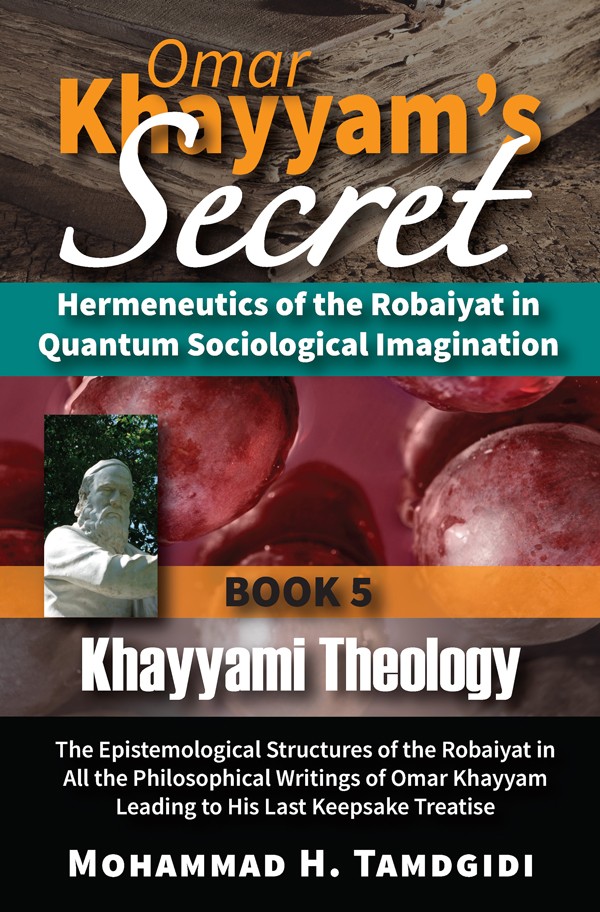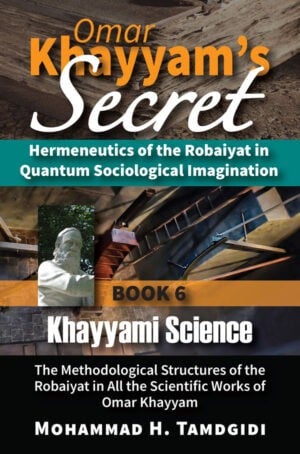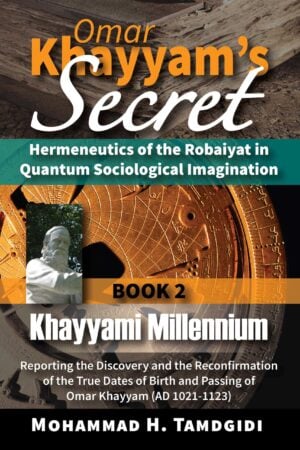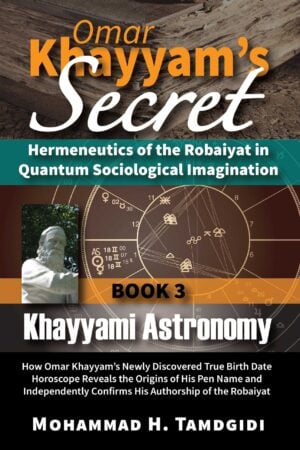Book Section: BACKMATTER — Including the Conclusion to “Omar Khayyam’s Secret” Series: Book 5: Khayyami Theology — by Mohammad H. Tamdgidi
$20.00
This includes the conclusion and backmatter of Book 5 of the Omar Khayyam’s Secret series.
The essay, titled “Conclusion to Book 5: Summary of Findings,” serves as the conclusion to the book Khayyami Theology: The Epistemological Structures of the Robaiyat in All the Philosophical Writings of Omar Khayyam Leading to His Last Keepsake Treatise, which is the fifth volume of the twelve-book series Omar Khayyam’s Secret: Hermeneutics of the Robaiyat in Quantum Sociological Imagination, authored by Mohammad H. Tamdgidi. In this conclusion, the author offers a brief summary first and then a more detailed summary of the book.
Description
Abstract
This includes the conclusion and backmatter of Book 5 of the Omar Khayyam’s Secret series.
This essay, titled “Conclusion to Book 5: Summary of Findings,” serves as the conclusion to the book Khayyami Theology: The Epistemological Structures of the Robaiyat in All the Philosophical Writings of Omar Khayyam Leading to His Last Keepsake Treatise, which is the fifth volume of the twelve-book series Omar Khayyam’s Secret: Hermeneutics of the Robaiyat in Quantum Sociological Imagination, authored by Mohammad H. Tamdgidi. In this conclusion, the author offers a brief summary first and then a more detailed summary of the book.
In Book 5, to understand the theological epistemology (or, way of knowing God) framing Khayyam’s Robaiyat as spread out in all his philosophical works, Tamdgidi further offered the texts and his updated Persian and new English translations and analyses of six writings that preceded Khayyam’s last keepsake treatise on the universals of existence.
The six primary texts included: 1: Khayyam’s annotated Persian translation of Avicenna’s sermon in Arabic on God and creation; 2: Khayyam’s treatise in Arabic addressed to Nasawi (who I showed has been wrongly regarded as an Avicenna pupil) on the created world and worship duty; 3-5: Khayyam’s three treatises in Arabic (which I showed were all addressed to Abu Taher, to whom Khayyam also dedicated his treatise on algebra) that are separate chapters of a three-part treatise on existence on topics ranging from the necessity of contradiction, determinism, survival, attributes of existents, and the light of intellect on ‘existent’ as the subject matter of universal science; and 6: Khayyam’s treatise in Arabic addressed to Moshkavi (who I revealed was a supportive Shia intellectual) in response to three questions on soul’s survival, on the necessity of accidents, and on the nature of time.
The first chapter of the book was titled, “Omar Khayyam’s Annotated Persian Translation of Avicenna’s ‘Splendid Sermon’ in Arabic on God’s Unity and Creation: The Manuscript with a New English Translation, Followed by Comparative Textual Analysis.”
The second chapter of the book was titled “Omar Khayyam’s Treatise on the Created World and Worship Duty: The Arabic Manuscript with Updated Persian and New English Translations, Followed by Textual Analysis.”
The third chapter of the book was titled “Part 1 of Omar Khayyam’s Treatise on Existence Addressed to Abu Taher Regarding the Necessity of Contradiction, Determinism, and Survival: The Arabic Manuscript and Updated Persian and New English Translations, Followed by Textual Analysis.”
The fourth chapter of the book was titled “Part 2 of Omar Khayyam’s Treatise on Existence Addressed to Abu Taher Regarding Attributes: The Arabic Manuscript and Updated Persian and New English Translations, Followed by Textual Analysis.”
The fifth chapter of the book was titled “Part 3 of Omar Khayyam’s Treatise on Existence Addressed to Abu Taher Regarding the Light of Intellect on ‘Existent’ as the Subject Matter of Universal Science: The Arabic Manuscript and Updated Persian and New English Translations, Followed by Textual Analysis.”
The sixth chapter of the book was titled “Omar Khayyam’s Treatise Addressed to Moshkavi in Response to Three Questions on Soul’s Survival, the Necessity of Accidents, and the Nature of Time: The Arabic Manuscript and Updated Persian and New English Translations, Followed by Textual Analysis.”
The seventh chapter of the book was titled “From Grapes to Wine, Khayyam’s Unitary Way of Knowing: Integratively Understanding the Structures of Omar Khayyam’s Theological Epistemology in the Robaiyat as Spread Out in All His Philosophical Writings.”
In this book, it was shown that the most fruitful way of understanding Khayyam’s six texts is by regarding them as efforts made at defending his “succession order” thesis implicitly revealed when commenting on Avicenna’s sermon and finalized in his last keepsake treatise. The texts served to offer the theological epistemology behind Khayyam’s thesis, revealing his creative conceptualist view of existence that informed his poetic way of going about knowing God, creation, and himself within a unitary Islamic creationist-evolutionary worldview.
It was shown that Khayyam’s way of knowing God and existence is non-dualistic, non-atomistic, and unitary in worldview, allowing for subject-included objectivity, probabilistic determinism, transcontinuous (or ‘discontinuous’) creative causality, transdisciplinarity, and transculturalism; it thus fulfils in a prescient way all the eight attributes of the quantum vision (Tamdgidi 2020). Poetry is most conducive to unitary knowing, and subject-included objectivity must necessarily be self-reflective and thus engage intellective, emotional, and sensible modes of knowing. This explains why Khayyam transcended scholastic learning in favor of a poetic encounter with reality. What he meant by ‘Drunkenness,’ calling it the highest state of mind known to him, can thus be best understood as a unitary, quantum state of mind achieved by way of his poetry as a meditative art of self-purification (what he called “tazkiyeh-ye nafs”). The goal, metaphorically, is to move from a way of knowing things as divisible grapes to a pure and unitary way of knowing them as indivisible Wine—paralleling what we call today moving from chunky Newtonian toward unitary quantum visions of reality.
Tamdgidi posited that the key for entering Khayyam’s secret tent is realizing that what he primarily meant by ‘Wine’ in his Robaiyat was self-referentially his Robaiyat itself, a key openly hidden therein thanks to his theological epistemology. For him, the Robaiyat was a lifelong work on himself, serving also human spiritual awakening to its place and duty in the succession order of God’s creation. It also served his aspiration for a lasting soul. He knew the now-proven worth of his secret magnum opus, and that is why he so much praised his ‘Wine.’
Recommended Citation
Tamdgidi, Mohammad H. 2022. “BACKMATTER — Including the Conclusion to “Omar Khayyam’s Secret” Series: Book 5: Khayyami Theology.” Pp. 483-590 in Omar Khayyam’s Secret: Hermeneutics of the Robaiyat in Quantum Sociological Imagination: Book 5: Khayyami Theology: The Epistemological Structures of the Robaiyat in All the Philosophical Writings of Omar Khayyam Leading to His Last Keepsake Treatise. (Human Architecture: Journal of the Sociology of Self-Knowledge: Vol. XVIII, 2022. Tayyebeh Series in East-West Research and Translation.) Belmont, MA: Okcir Press (an imprint of Ahead Publishing House).
Where to Purchase Complete Book: The various editions of the volume of which this Book Section is a part can be ordered from the Okcir Store and all major online bookstores worldwide (such as Amazon, Barnes&Noble, Google Play, and others).
Read the Above Publication Online
To read the above publication online, you need to be logged in as an OKCIR Library member with a valid access. In that case just click on the large PDF icon below to access the publication. Make sure you refresh your browser page after logging in.








